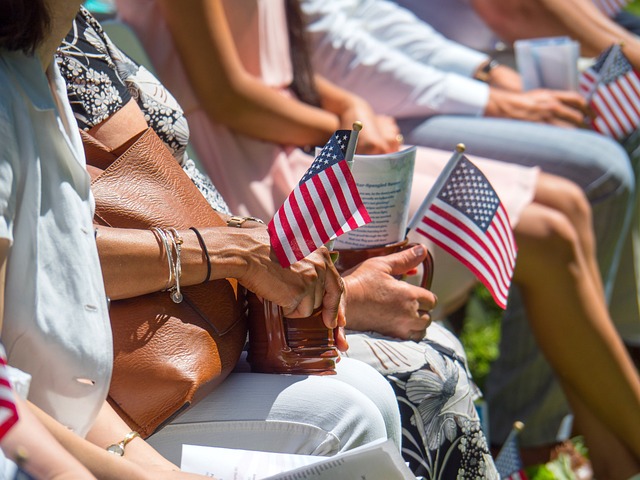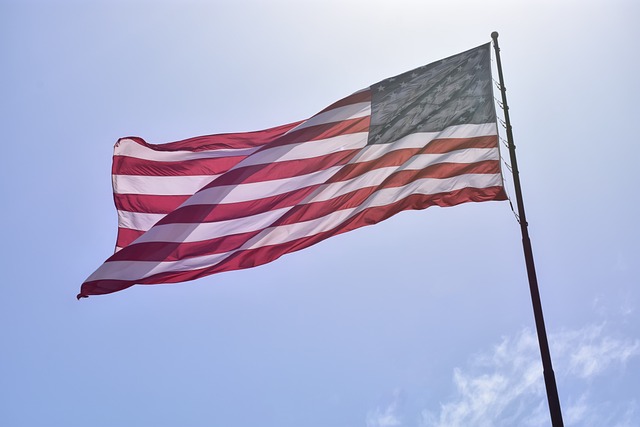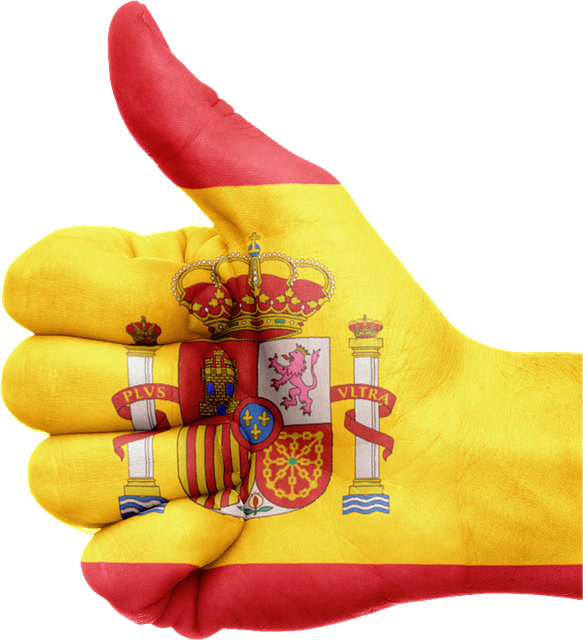The significance of "We the People" and the American Flag is explored in relation to American jurisprudence and democracy. "We the People," a cornerstone of the U.S. Constitution's preamble, represents the source of governmental authority from the consent of its people. The American Flag symbolizes national unity, pride, and the ideals of freedom, justice, and equality it stands for. These symbols are integral to the legal system and civil discourse, emphasizing individual freedoms, checks and balances, and the rule of law to prevent tyranny. The flag's presence in courtrooms underscores the solemnity of the judicial process and the pursuit of justice as a manifestation of the people's collective will. It signifies the equal administration of law, transcending individual differences, and upholds democratic values central to the American legal system. Throughout history, the flag has adapted alongside American society, serving as a constant reminder of the nation's commitment to liberty and justice for all. The article underscores that "We the People" are the ultimate stewards of justice and legitimacy in America, with active civic engagement and respect for legal norms being essential for maintaining a just and legitimate legal system. The American Flag stands as a symbol of this collective responsibility, reinforcing the idea that justice is not only administered but revered within the United States.
In the intricate tapestry of legal systems, the principles encapsulated within “We the People” form the bedrock of American law and justice. This article delves into the enduring significance of these foundational tenets, highlighting their manifestation in the solemnity of courtrooms where the American Flag stands as a potent symbol of unity, sovereignty, and justice. As we explore the synergy between civic engagement and legal discourse, we uncover the pivotal role that citizens play in upholding the integrity and legitimacy of U.S. law. Join us on this insightful journey through the pillars of American jurisprudence.
- We the People: The Foundational Principles of American Law and Justice
- The Symbolism of the American Flag in Legal Proceedings
- Civic Engagement: How 'We the People' Shapes Legal Discourse in the U.S.
- The Role of Citizens in Maintaining Justice and Legitimacy in Law
We the People: The Foundational Principles of American Law and Justice

The phrase “We the People” is a cornerstone of American jurisprudence, encapsulating the democratic ethos upon which the United States legal system is built. This foundational principle, articulated in the preamble to the U.S. Constitution, signifies that the authority of the government originates from the consent of the governed. The American Flag, a symbol of national unity and pride, embodies the values and ideals of freedom, justice, and equality under the law that this principle upholds. The flag serves as a visual reminder of the collective commitment to these foundational concepts, which are not mere abstractions but the very bedrock of American civil discourse and legal practice. It is through the Constitution and the Bill of Rights that “We the People” have established a framework for governance that prioritizes individual liberties and checks and balances to safeguard against tyranny and abuse of power. The American Flag, woven into the fabric of this system, represents the collective aspiration towards a more perfect union, where justice is administered impartially and the rule of law prevails over arbitrary authority. This enduring symbol has witnessed the evolution of American society and the ongoing effort to fulfill the promise of liberty and justice for all who dwell within its boundaries.
The Symbolism of the American Flag in Legal Proceedings

The American flag, a potent symbol of national unity and identity, holds significant meaning within legal proceedings. In courtrooms across the country, the flag stands as a physical representation of “We The People,” the foundational assertion of collective governance articulated in the preamble to the United States Constitution. As judges preside and jurors deliberate under its watchful stars and stripes, the flag serves as a reminder of the shared sovereignty that forms the basis of American legal tradition. It signifies the equal application of law, irrespective of one’s creed, color, or background—a principle deeply rooted in the country’s democratic ethos. The flag’s presence in the courtroom is not merely ceremonial; it underscores the gravity of the legal process and the importance of justice as an institution that represents the collective will of the people. It is a silent yet potent witness to the oaths taken, testimony given, and verdicts rendered, embodying the ideals of liberty and justice for all who enter under its gaze. The flag’s symbolism in legal settings transcends the abstract; it anchors the judicial system to the tangible aspirations and values enshrined in the nation’s founding documents, serving as a daily affirmation of the rule of law and the enduring spirit of American democracy.
Civic Engagement: How 'We the People' Shapes Legal Discourse in the U.S.

In the United States, the phrase “We the People” from the preamble of the Constitution stands as a testament to the democratic principles upon which the nation was founded. This foundational concept not only underscores the collective authority of citizens but also actively shapes the legal discourse and civic engagement within the country. The American populace, through various means, influences legal interpretations, policy-making, and societal norms, thereby ensuring that the legal system remains responsive to the will of its people. The role of ‘We the People’ is evident in the grassroots movements that have led to significant legislative changes, from civil rights advancements to the ongoing evolution of voting rights. These movements often involve direct civic engagement, such as petitions, public demonstrations, and community organizing, all of which serve to bring the voices of citizens into the halls of justice. The American Flag, a symbol of national unity and pride, often becomes a visual representation of these efforts, as it is frequently seen at protests, legal rallies, and events that champion the rights and values of the people. The flag, therefore, not only signifies the sovereignty of the nation but also the sovereignty of its citizens in shaping the legal landscape and ensuring that their voices are heard in the discourse of law and justice communities across the United States.
The interplay between ‘We the People’ and legal discourse is a dynamic process, one that is continuously evolving as new social issues come to the forefront. The judiciary often serves as a barometer for the pulse of the nation, with court rulings reflecting the evolving sentiments and priorities of the populace. Landmark decisions such as Brown v. Board of Education and Roe v. Wade are examples of how the legal discourse has been influenced by the collective will of the people, highlighting the pivotal role that civic engagement plays in the American legal system. The ongoing dialogue between citizens and lawmakers ensures that ‘We the People’ remains a central force in the shaping of legal precedents and the interpretation of constitutional rights, making the United States a nation where the rule of law is both upheld and responsive to the will of its people.
The Role of Citizens in Maintaining Justice and Legitimacy in Law

In the United States, the principle that “We The People” hold the power to maintain justice and legitimacy in law is a cornerstone of the American legal system. This concept, deeply rooted in the country’s founding documents, underscores the responsibility of citizens to uphold the rule of law. Citizens play a pivotal role in ensuring that justice is not only administered fairly but also that it reflects the collective values and ethos of society. Their vigilance in monitoring government actions, their participation in civic activities, and their adherence to legal norms are critical components of a just and legitimate legal system. The American Flag, a symbol of national unity and pride, serves as a constant reminder of the ideals upon which the nation was founded, including justice, liberty, and equality under the law. It is through the active engagement of citizens, who honor these ideals in their daily lives, that the principles embodied by the flag are brought to life and sustained within the legal framework of the country.
Furthermore, the role of citizens extends beyond mere compliance with legal statutes; it encompasses their engagement in the democratic process. By exercising their right to vote, participating in public discourse, and holding elected officials accountable, citizens contribute to the integrity of the judicial system. This participatory approach not only reinforces the legitimacy of legal decisions but also ensures that justice remains accessible and equitable for all members of society. The collective action of individuals who respect and uphold the law is instrumental in maintaining a legal environment where justice is not only dispensed but also revered as an integral aspect of American life, symbolized by the American Flag that stands as a beacon of hope and freedom for generations to come.
